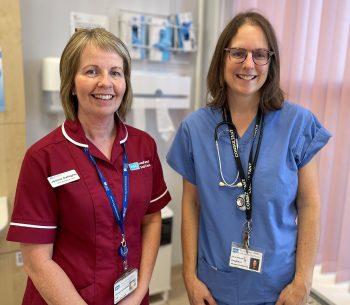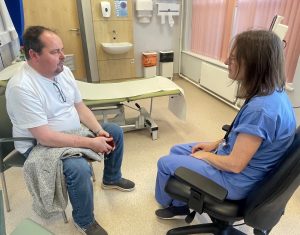
The South Eastern Trust’s Palliative Care Hub at Ards Hospital is playing a vital role in supporting patients with palliative care needs in their own community.
The Team helps many people to avoid unnecessary hospital admissions, while ensuring they receive specialist, compassionate care.
The hub provides rapid outpatient support for people at home, who have a palliative diagnosis and are experiencing symptoms such as pain, nausea, or other distressing conditions. Patients can be referred directly to the hub, where investigations, medication adjustments and follow-up care can be arranged. The team works closely with GPs, Hospice Nurses and hospital colleagues to ensure continuity of care.
South Eastern Trust, Consultant in Palliative Medicine, Dr Tracy Anderson, explained, “The hub is very much a multi-disciplinary service. We have medical staff, Specialist Nurses and a Specialist Pharmacist who focus on medication and symptom control, but we also have wider support from Physiotherapists, Occupational Therapists, Speech and Language Therapists, Dietitians and Social Workers. We can access counselling and complementary therapies too, so we are able to identify patients’ needs in all areas and refer them to the right specialist.
“We try to do as much as we can during a hub visit, but many team members will also see patients in their own homes. We work very closely with Hospice Nurse Specialists and if a patient can’t come to us, we can do joint visits in the community.
“It is really important for people who want to remain at home to have access to specialist palliative care. We know from feedback that patients and families find this service invaluable in improving quality of life and allowing people to be where they want to be.”
The hub also plays an important role in supporting patients discharged from hospital, ensuring their symptoms are managed effectively at home and avoiding prolonged hospital stays. If required, the hub can also arrange a direct admission to hospice care from home, rather than through an acute hospital setting.
Dr Anderson added, “Having rapid access to the hub can often prevent unnecessary hospital admissions. Sometimes patients do require hospital treatment, but one of the strengths of our service is continuity. Many of our team, including myself, the Specialist Nurse and Pharmacist, also work in the Ulster Hospital. That means when patients are admitted, we can continue to support them in hospital and when they are ready for discharge, we can ensure they are safely followed up in the community.”
Clinical Nurse Specialist in Palliative Care, Joanne Gallagher, highlighted how the hub has grown in recent years to provide joined-up, holistic care, “The hub is a really good service and it has been lovely to be involved in its development. We often meet patients from this area when they are admitted to the Ulster Hospital, so when they are referred to us afterwards, they already know us. That continuity of care, whether face to face or over the phone, can make such a difference for patients and families.
“More importantly, patients and families can contact us easily. Quick access to advice or review is so reassuring when someone is struggling at home. We also work very closely with GPs and Hospice Nurses, so there is seamless continuity of care.”
Joanne reflected on one patient who particularly stood out to her, “I remember a young mother we met in hospital who was very anxious about being referred to palliative care, because many people think that means end-of-life care. We reassured her that our role was also about symptom management and quality of life. The medication changes we made really helped her and she was able to spend precious time at home with her children before later being admitted to hospice. For her and her family, that support made a real difference and that is what our work is all about.”




